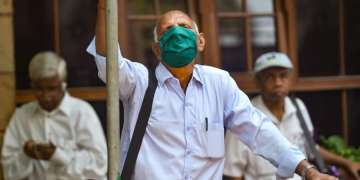The central government on Saturday told the Supreme Court that under the national COVID-19 vaccination programme it has devised a strategy to inoculate the elderly and the differently abled, who may have been left behind because of inability to travel to vaccination centres.
It said that therefore, in view of this need and to ensure easy access, it was felt pertinent to bring vaccination services closer to the community and nearer to homes, while maintaining all necessary precautions and safety measures, according to operational guidelines and advisories issued from time to time.
The government said that the Ministry of Health and Family Welfare (MoHFW) has issued its directive on May 29, prohibiting carrying out any vaccination drives in star hotels. Such drive must be stopped immediately or necessary legal and administrative actions would be initiated against such erring institutions, it said.
"In this regard it is submitted that the MoHFW constituted a committee consisting of domain knowledge experts to examine this issue which recommended the strategy of Near to Home COVID Vaccination Centres (NHCVC) to cater to special needs of elderly and differently abled persons," it said, adding that this strategy has also been endorsed by the National Expert Group on Vaccine Administration for COVID-19 (NEGVAC), which has both government and non-government experts.
The Centre said that the strategy of NHCVC for the elderly and the differently abled is flexible, people-centric and follows a community-based approach, where sessions can be conducted in non-health facility based settings and are nearer to home, like in a community centre or residents welfare association, office, panchayat ghar, school buildings, old age homes, sub-health centres and health and wellness centres with availability of adequate space.
Giving the details of the strategy, the Centre said under the setup, the overall planning, review and implementation will be the responsibility of district, urban or block task forces.
"The NHCVC will be linked to an existing CVC for planning and execution of the vaccination session. These NHCVC will be organised especially for this target population (that is all individuals above 60 years of age and individuals below 60 years with disability due to physical or medical conditions) while vaccination for all other age groups will continue at the existing CVCs," it said.
The Centre’s affidavit filed in the suo motu matter on COVID-19 management said that the beneficiaries can either register themselves in advance, on-site or can register following the Facilitated Cohort Registration process on Co-WIN.
“For management of any adverse event following immunization (AEFI), an advanced life support/basic life support/transport vehicle must be stationed at the NHCVCs for transport to nearby AEFI Management Centre'', it said.
The Centre said that guidelines on NHCVC was shared with all states and union territories on May 27 and is also available on the health ministry's website.
It said that the MoHFW has issued an advisory to the state and Union Territory governments that officials like district level officers of the disability or social welfare departments should be considered as designated nodal officer for the purpose. The nodal officer will also deal with redressal of grievances of differently abled persons in connection with COVID-19 on real-time basis, the Centre said.
Latest India News

